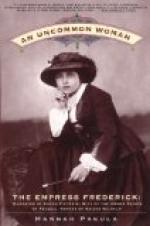“We have not yet advanced a step with our Princess Natalie,” said Stephano, shrugging his shoulders; “that, it seems, is an impregnable fortress!”
“It must, however, yield to us,” laughingly responded Alexis Orloff, “and she shall yet acknowledge us as conquerors. We are undermining, Stephano, and when the building crushes her in its crashing fall, will she first discover that she has long been in danger. And what said you—that we have not yet advanced a step? And yet Rasczinsky is gone, and we have known how to keep Cardinal Bernis, who would have interested himself for the little one, so very much occupied with the affair of the Jesuits, that he has yet had no time to think of the princess. Ah, these Jesuits are very useful people. We strew them like snuff in the faces of these diplomatists, and, while they are yet rubbing their weak eyes and crying out with pain, we shall quietly draw our little fish into our net, and take her home without opposition!”
“And if the fish will not go into the net?”
“It must go in!” impatiently cried Orloff. “Bah! have I at the right time succeeded in towing our emperor, God bless him! into eternity, and shall I doubt in the fulness of time of enclosing this beautiful child in my arms! Look at me, Stephano—what is wanting for it in me? Are not all these beautiful women of Rome enraptured with the Russian Hercules? How, then, can it be that a woman of my own country can withstand me? The preliminaries are the main thing, and if we only had some one to prepare her for my appearance, all would then go well. And such a one we will find, thanks to our rubles! But enough of politics for the present, Stephano. Call my valet. It is time for my toilet, and that is a very important affair.”
CORILLA
Corilla was alone. Uneasy, full of stormy thoughts, she impetuously walked back and forth, occasionally uttering single passionate exclamations, then again thoughtfully staring at vacancy before her. She was a full-blooded, warm Italian woman, that will neither love nor hate with the whole soul, and nourishes both feelings in her bosom with equal strength and with equal warmth. But, in her, hatred exhaled as quickly as love; it was to her only the champagne-foam of life, which she sipped for the purpose of a slight intoxication—as in her intoxication only did she feel herself a poetess, and in a condition for improvisation.
“I must at any rate be in love,” said she, “else I should lose my poetic fame. With cool blood and a tranquil mind there is no improvising and poetizing. With me all must be stirring and flaming, every nerve of my being must glow and tremble, the blood must flash like fire through my veins, and the most glowing wishes and ardent longings, be it love or be it hate, must be stirring within me in order to poetize successfully. And this cannot be comprehended by delicate and discreet people; this low Roman populace even venture to call me a coquette, only because I constantly need a new glow, and because I constantly seek new emotions and new inspirations for my muse.”




